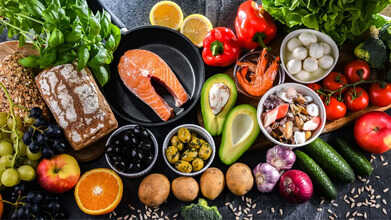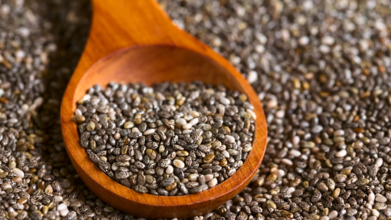- Health Conditions A-Z
- Health & Wellness
- Nutrition
- Fitness
- Health News
- Ayurveda
- Videos
- Medicine A-Z
- Parenting
- Web Stories
Mediterranean Diet Could Lower Alzheimer’s Risk by 35%, Study Finds: How It Supports Brain Health

Credits: Canva
Taking care of our brains should be a top health priority. After all, the brain controls nearly every function in our body. As we age, however, our brain function naturally declines, and the risk of dementia rises. Dementia is a term that covers memory loss and other cognitive difficulties that significantly affect daily life. Current data suggest that the number of dementia cases—now around 514,000 per year, could double by 2060, highlighting the urgent need for ways to protect the brain.
Research shows that lifestyle choices have a major impact on brain health. But did you know that certain diets can help lower your risk of Alzheimer’s? Here’s what you need to know.
What is Mediterranean Diet?
The Mediterranean diet is a plant-focused way of eating, inspired by the traditional diets of Mediterranean countries. It emphasizes fresh fruits and vegetables, whole grains, legumes, nuts, seeds, and olive oil as the main source of fat. The diet includes moderate amounts of fish and dairy while limiting red meat and sweets. Beyond what’s on the plate, it also encourages lifestyle habits such as regular physical activity and sharing meals with others, which supports social connections and helps reduce stress.Mediterranean Diet Could Lower Alzheimer’s Risk by 35%
A long-term study conducted by the Nurses’ Health Study (NHS), which followed female nurses from 1989 to 2023, found that people who closely followed the Mediterranean diet over the years had a significantly lower risk of dementia and better cognitive function. This protective effect was particularly evident in individuals with varying genetic risk for Alzheimer’s, including carriers of the APOE-e4 gene. Similar findings were also observed in the male Health Professionals Study.ALSO READ: Diet For Mental Health: How Keto Helps With Depression
While the Mediterranean diet as a whole was linked to reduced dementia risk, researchers highlighted a few key components that seem to have the most impact: fresh fruits, nuts, and sources of monounsaturated fats, such as olive oil and avocados.
The study indicates that sticking to the Mediterranean diet over the long term may substantially lower the risk of Alzheimer’s, even for those with a genetic predisposition. This diet is packed with fiber, antioxidants, healthy fats, and lean proteins, found in foods like fruits, vegetables, nuts, seeds, legumes, whole grains, seafood, and olive oil. Incorporating more of these foods into your daily meals can be a simple way to support brain health.
How To Follow a Mediterranean Diet?Incorporating the Mediterranean diet into your daily routine doesn’t have to be complicated. Start by adding more fresh fruits and vegetables to every meal, swapping refined grains for whole grains, and including nuts, seeds, and legumes as snacks or salad toppings. Use olive oil as your main cooking fat instead of butter or processed oils, and aim to include fish or seafood a few times a week.
ALSO READ: Never Eat Chia Seeds THIS Way: Doctor Warns Of Hidden Dangers
Red meat and sweets can be enjoyed occasionally, rather than daily. Beyond food, try to stay active through walking, yoga, or other forms of exercise, and make mealtimes a social experience whenever possible, sharing meals with family or friends to combine nutrition with connection and reduced stress.
For personalised guidance, consulting a registered dietitian can help you create a plan that fits your tastes and lifestyle.
MCT Oil Explained: Benefits, How To Use It, And Why It’s Gaining Popularity

Credits: Canva
MCT oil has become a popular supplement in the world of health and wellness, often praised for its ability to boost energy, support weight management, and improve brain function. Derived from medium-chain triglycerides, fats that are more easily digested and converted into energy than long-chain fats.
Whether you are an athlete, someone looking to support cognitive health, or simply exploring healthier fat options, understanding what MCT oil is, how to use it, and why it has gained so much attention can help you decide if it belongs in your daily routine.
What Is MCT Oil?Medium-chain triglyceride (MCT) oil is a processed oil typically derived from coconut or palm kernel oil, though small amounts of MCTs are also naturally present in foods like dairy. As the name suggests, MCT oil contains medium-length chains of fats called triglycerides. Because these fatty acids are shorter than the long-chain fats found in many other foods, the body can digest and convert them into energy more quickly.
There are four main types of medium-chain fatty acids: lauric acid, caproic acid, caprylic acid, and capric acid. MCT oil is made up almost entirely of caprylic and capric acids, which are thought to be the most easily absorbed and metabolised by the body.
MCT oil is versatile and easy to add to your daily routine, but it’s best to start small to see how your body responds. Begin with 1 teaspoon a day and gradually increase to 1–2 tablespoons if tolerated. Here are some simple ways to use it:
- In your morning coffee or tea: Blend it in for a creamy texture and sustained energy.
- Smoothies and shakes: Add a spoonful for an extra boost of healthy fats.
- Salad dressings or sauces: Use it as a light base or mix with olive oil.
- Cooking: MCT oil has a low smoke point, so it’s best for drizzling over foods rather than frying or high-heat cooking.
Why Is MCT Oil Getting So Popular?
MCT oil has surged in popularity because of its reputation as a quick and efficient source of energy and its potential health benefits. Unlike longer-chain fats, MCTs are rapidly absorbed by the body and converted into fuel, making them a favorite among athletes, busy professionals, and anyone looking for an energy boost.Additionally, studies suggest that MCT oil may support weight management, improve mental clarity, and even aid digestion. It is is easy to add to coffee, smoothies, or salad dressings which also makes it an attractive option for those seeking a simple way to incorporate healthy fats into their diet.
MCT Oil: Benefits
Research suggests MCT oil may support weight management, improve cognitive function, and provide a quick source of energy since it is metabolized faster than other fats. Some studies also point to its role in reducing risk factors for heart disease and aiding people with digestive issues who struggle to absorb fats. For example, a 16-week clinical trial published in the American Journal of Clinical Nutrition found that participants using MCT oil lost more body weight compared to those using olive oil.While MCT oil is not a magic fix, it can be a useful addition to a balanced diet when taken in moderation. Its potential benefits for energy, metabolism, and brain health make it popular among health enthusiasts, but it is important to consult a doctor before making it a regular part of your routine. Choosing high-quality MCT oil and using it wisely can help you enjoy its advantages without unwanted side effects.
Common Sugary Drinks Can Increase The Risk Of Colorectal Cancer: Study Reveals A Direct Link To Advancement Of The Cancer

(Credit-Canva)
Sugary drinks have always been a big part of the processed food industry. Drinks like sweet sodas and sweet milks are always on the shelf, making it easier for people to indulge in them. However, a new study has highlighted that they have been directly linked to colorectal cancer.
A new study from the University of Texas MD Anderson Cancer Center has revealed a concerning link between the sugar in popular drinks and advanced colorectal cancer. Researchers found that the common mix of glucose and fructose in these beverages might directly speed up the spread of the disease. This is a very important discovery, especially since these same sugary drinks are often recommended for cancer patients to help them with nutrition.
The study shows that what we eat plays a crucial part not just in whether we get cancer, but also in how the disease acts once it has developed.
Over the years studies have shown that things like processed foods can be linked to affecting our health, but could this study lead us to finding a better way to treat and preventing cancer?
How Sugar Makes Cancer More Dangerous
In their research, the scientists created lab models to test different types of sugar on cancer cells. They looked at glucose alone, fructose alone, and a mix of the two—the kind you find in many sodas and juices. What they discovered was surprising: only the glucose-fructose mix made the cancer cells much more active and able to move. This increased movement led to a faster spread of tumors, particularly to the liver, which is the most common place for this cancer to metastasize (spread).
The study also pinpointed the exact way this happens. The sugar mix turns on an enzyme in the body called sorbitol dehydrogenase (SORD). This enzyme then helps the cancer cells get more energy from sugar and also activates a pathway related to cholesterol. This cholesterol pathway is already known to be involved in cancer spreading throughout the body.
Can You Slow Down The Growth of Cancer?
The researchers made another promising finding. They showed that they could slow down the cancer's spread by blocking the SORD enzyme. This worked even when the cancer cells were exposed to sugary drinks. This discovery opens the door for new medicines that could be designed to target and stop this specific process.
The study also suggests a new use for drugs that are already on the market. Statins, which many people take to lower their cholesterol, work by blocking the same pathway that the SORD enzyme activates. This raises an exciting possibility: these common cholesterol drugs might be able to help doctors manage and treat colorectal cancer.
These findings build on earlier research from the same lab that showed even a small amount of sugary drinks can help tumors grow, and this happens even in people who aren't obese. Because of these results, the researchers are now suggesting that doctors and nutritionists should rethink their current advice about giving sugary drinks to cancer patients, especially those with advanced disease.
Never Eat Chia Seeds THIS Way: Doctor Warns Of Hidden Dangers

(Credit-Canva)
Chia seeds have earned their reputation as a popular superfood for good reason. They are packed with healthy nutrients like omega-3 fatty acids, which are great for your brain and heart. They also contain a lot of fiber, which helps with digestion and keeps you feeling full, and antioxidants, which protect your body from damage. These little seeds can be a great addition to your diet for a healthier heart, better digestion, and help with weight management. But there's a catch: you have to prepare them the right way.
We have all heard of the benefits of chia seeds and many health coaches also explain why it is important to eat it better. However, what many people do not realize is that unlike other foods, that can be consumed either way, prepared or raw, chia seeds need to be prepared before you have them.
How To Eat Chia Seeds The Right Way?
The reason you have to be careful with chia seeds is because of their incredible ability to absorb liquid. They can soak up a huge amount of water—up to 12 or even 27 times their dry weight! This is what gives them that satisfying, filling quality. However, if you swallow them dry and then drink water, they can start to expand right inside your body.
According to medical experts like Dr. Karan Sood and gastroenterologist Dr. Saurabh Sethi, this can be very dangerous. In one well-known case, a man swallowed a spoonful of dry seeds with some water, and they swelled up so much that they created a blockage in his throat. While this is rare, it's a serious risk, especially for people who have trouble swallowing or have other digestive issues. In some cases, doctors have had to perform a procedure to remove the stuck seeds from a person's esophagus.
How Can You Avoid Chia Seed Dangers?
To avoid any risks, the most important rule is to always soak chia seeds before you eat them. It's a simple step that makes a huge difference. You should let them soak for at least 10 to 15 minutes, but leaving them in liquid overnight is even better. This process allows the seeds to fully absorb the water and form a soft, gel-like texture. This gel is not only safe to eat, but it also helps with digestion.
If you're new to eating chia seeds, it's smart to start with a small amount, like just one teaspoon, and slowly add more to your diet over time. Also, remember that since they absorb so much moisture, you should drink plenty of water throughout the day to stay hydrated. If you're ever unsure about adding them to your diet, it's best to check with your doctor first to make sure they're right for you.
Chia seeds are a great source of fiber and you can increase your chia seed intake by adding a spoonful in your water bottle, or in overnight puddings with milk along with the fruits, making it an easy and excellent breakfast.
© 2024 Bennett, Coleman & Company Limited

